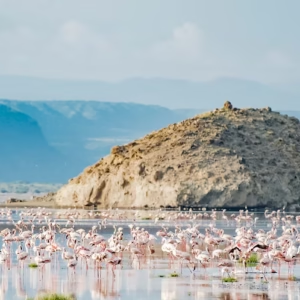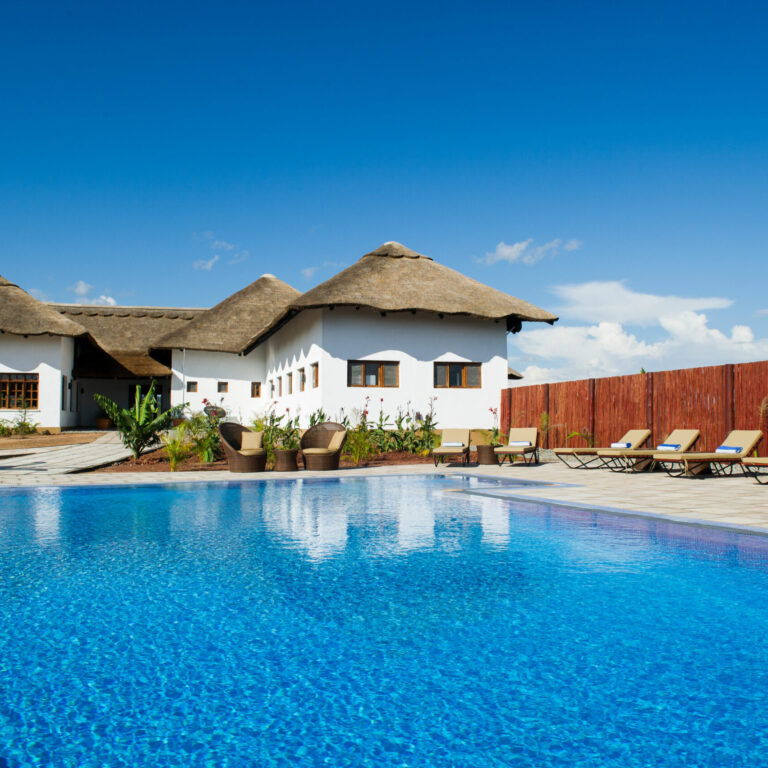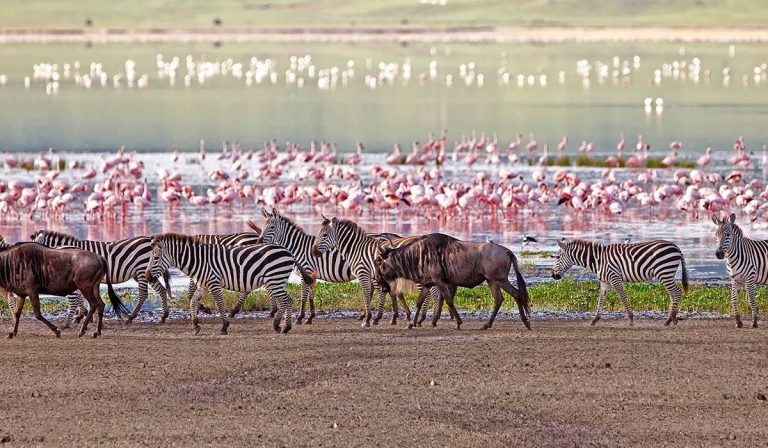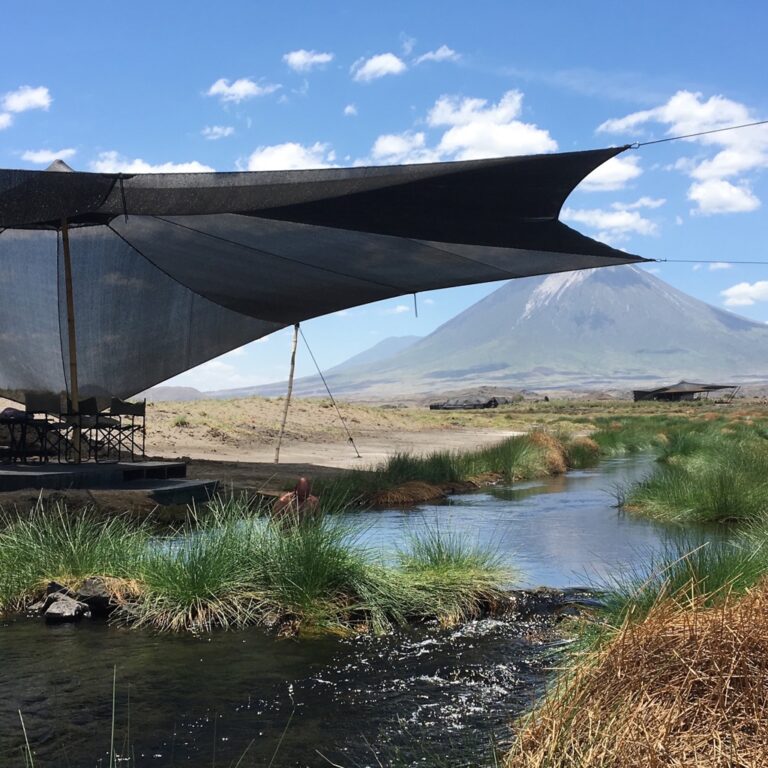The best time to go on safari in Africa generally coincides with the dry season, typically from June to October. This period offers optimal wildlife viewing conditions due to the scarcity of water, causing animals to congregate around remaining water sources. While this is the most popular time, the “green season” (November to April) also provides unique experiences, including verdant landscapes and abundant birdlife. In this article, we will explore the five key factors that influence the best time to go on an African safari, provide a month-by-month guide to top safari destinations, and answer some frequently asked questions to help you plan the family, honeymoon, or luxury safari vacation of your dreams.
Dry Season (June – October): Best wildlife viewing: Animals are easier to spot as they gather around water, making the “Big 5” sightings more likely. Pleasant weather: Warm days (up to 29°C) with cool evenings (13°C) and minimal rainfall. Reduced mosquito activity: Less rain means fewer mosquitoes. Popular time for the Great Migration: In Tanzania, the dry season coincides with the Great Migration in the Serengeti.
Green Season (November – April): Verdant landscapes: The rains bring lush green vegetation, creating a beautiful and vibrant landscape. Abundant birdlife: The green season attracts a wide variety of bird species. Fewer tourists: The rainy season tends to attract fewer visitors than the dry season. Potential for afternoon showers: While rainfall is not as heavy as during the peak of the wet season, afternoon showers can still occur.
Five Factors that influence the best time of the year to go on an African Safari
African safari tours offer diverse wildlife viewing opportunities and are a popular choice for travelers seeking adventure and unforgettable experiences. These tours can be tailored to individual preferences and budgets, ranging from budget-friendly options to luxury explorations. Popular destinations include Tanzania, with its iconic Serengeti National Park and Ngorongoro Crater, and Kenya, known for its vast landscapes and diverse wildlife. Other notable safari destinations include Tarangire Lake, Manyara, and Arusha National Park, each offering unique Special African Safari & Tour Offers wildlife encounters and landscapes. The best time to go on safari in Africa is from June, July, August, September, October, November, to December, January, February to March corresponds with the Dry season. In the main time to visit safari countries, you will have the best chance of seeing the Great Migration in the Serengeti.
Weather and Climate
The weather and climate in Africa vary significantly from region to region best to plan an African Safari. Understanding the weather patterns is crucial in determining when to go on safari. The two primary seasons to consider are the dry season and the wet season.
Dry Season: This is often the best time for safaris as the dry conditions make wildlife easier to spot. The dry season typically falls during the winter months from June to October in many African countries best time for an African Safari. You can enjoy clear skies and less vegetation, which means animals congregate around water sources, making them more accessible for observation.
Wet Season: The wet season, usually from November to April, can be a challenging time for safaris due to heavy rains, not the best time for African Safaris. However, it’s also the birthing season for many animals, offering unique opportunities to witness newborn wildlife best time for an African Safari. The landscapes are lush and vibrant, but some areas may be inaccessible due to flooding.
Migration Patterns
Witnessing the Great Migration in East Africa is a bucket-list experience for many safari-goers. This annual event involves millions of wildebeests and zebras traveling in search of greener pastures is which is the all-around best time for African safari trips. The timing of the migration varies, but it generally occurs between June and September in Kenya’s Maasai Mara and from December to April in Tanzania’s Serengeti. To witness this spectacular natural phenomenon, plan your safari to align with the migration’s movements.
Wildlife Activity
Understanding the behavior of wildlife is crucial when deciding when to go on safari. Many animals are more active during specific times of the day, like early mornings and late afternoons best time for an African Safari. Planning your game drives around these times increases your chances of encountering animals in action. Additionally, consider specific animal behaviors, such as mating or birthing seasons, as they can influence your safari experience.
Crowds and Pricing
The popularity of safari destinations can lead to crowded game reserves during peak seasons. The Best Time to Visit Africa | Monthly Climate Guide of Africa. If you prefer a more intimate and serene experience, consider visiting during the shoulder seasons. Best time for an African Safari. Not only will you encounter fewer tourists, but you may also find better deals on accommodations and tours. Book with a reputable local company/tour operator agency with real reviews online. Inquire and get special offers, deals, and discounts, save up to 10% off best best-selling peak season.
Prices can fluctuate significantly throughout the year, so researching and booking well in advance can help you secure the best rates and accommodations for your budget.
Personal Preferences
Your personal preferences play a significant role in determining the best time for your African safari. Consider the best time for an African Safari, factors like your tolerance for hot weather, your interest in specific wildlife, and your flexibility with travel dates. Everyone’s ideal safari experience is unique, so tailor your plans to your preferences.
Where To Go on Safari in Africa Month by Month
Explore Africa’s diverse safari destinations month by month. In January, witness the Wildebeest calving in the Serengeti. February offers vibrant landscapes and the Great Migration. March showcases lush beauty, while April promises comfortable temperatures. May brings greenery and wildlife. June to December unfolds various spectacles, from the dry season to the Great Migration.
African Safari in January
Embark on a thrilling African Safari in January, where the dry season enhances wildlife visibility. Witness the Serengeti’s Wildebeest calving, marvel at the Great Migration, or explore Southern Africa’s diverse ecosystems. Mild temperatures make it perfect for game drives and cultural encounters. January offers a unique safari experience amidst Africa’s untamed beauty.
African Safari in February
Experience the magic of an African Safari in February. As summer unfolds, witness vibrant landscapes and diverse wildlife in their prime. Explore the Serengeti during the Wildebeest calving, encounter the Great Migration, or discover Southern Africa’s iconic Big Five. With pleasant temperatures, February promises an unforgettable safari adventure amidst Africa’s breathtaking wilderness.
African Safari in March
Embark on an enchanting African Safari in March. As summer unfolds, witness the wonders of nature amidst lush landscapes. Encounter the Serengeti’s Wildebeest calving, marvel at the Great Migration, or explore Southern Africa’s diverse ecosystems. With moderate temperatures, March offers a captivating safari experience, blending wildlife encounters with the beauty of the African wilderness.
African Safari in April
April brings a captivating African Safari experience. As the dry season commences, witness diverse wildlife against picturesque landscapes. Explore the Serengeti during the Great Migration, encounter the beauty of Southern Africa’s ecosystems, and enjoy comfortable temperatures. April promises an unforgettable safari adventure, blending nature’s spectacle with the allure of the African wilderness.
African Safari in May
In May, embark on an exhilarating African Safari as nature bursts into life. Experience the end of the rainy season, creating lush landscapes and vibrant greenery. Witness diverse wildlife against this backdrop, from the Serengeti’s Great Migration to Southern Africa’s iconic Big Five. May offers a unique safari adventure with comfortable temperatures and stunning natural beauty.
African Safari in June
June marks the pinnacle of an African Safari adventure. With the dry season underway, witness awe-inspiring wildlife encounters against the backdrop of golden savannahs. From the Great Migration in the Serengeti to Southern Africa’s Big Five, June promises unforgettable moments in the heart of the African wilderness.
African Safari in July
July beckons for an extraordinary African Safari. As the dry season unfolds, witness the iconic Great Migration in the Serengeti and Southern Africa’s majestic Big Five. With clear skies and crisp temperatures, July offers an unparalleled safari experience amidst the untamed beauty of the African wilderness.
African Safari in August
August unfolds a captivating African Safari experience. Amidst the dry season, witness the spectacle of the Great Migration in the Serengeti and encounter Southern Africa’s Big Five. With mild temperatures and clear skies, August promises an unforgettable safari adventure amidst the untamed splendor of the African wilderness.
African Safari in September
September invites you to an extraordinary African Safari. As the dry season continues, witness the climax of the Great Migration in the Serengeti and explore Southern Africa’s Big Five. With ideal weather, September promises a remarkable safari adventure amidst the untamed beauty of the African wilderness.
African Safari in October
October welcomes you to a thrilling African Safari. Amidst the dry season, witness diverse wildlife in the Serengeti and Southern Africa’s Big Five. With comfortable temperatures and clear skies, October promises an unforgettable safari adventure in the heart of the untamed African wilderness.
African Safari in November
November beckons for an exhilarating African Safari. As the dry season unfolds, experience diverse wildlife in the Serengeti and encounter Southern Africa’s Big Five. With pleasant temperatures and a hint of greenery, November promises a unique safari adventure in the heart of the African wilderness.
African Safari in December
December invites you to a magical African Safari. Amidst the dry season, witness diverse wildlife in the Serengeti and discover Southern Africa’s Big Five. With comfortable temperatures and a touch of holiday spirit, December promises an unforgettable safari adventure amidst the untamed beauty of the African wilderness.
Best Time for an African Safari FAQs
The dry season is the best time to go on an African safari. The reason for this is that animals usually gather around the few watering holes available in the dry season. First, the grazing animals like wildebeest and zebra come to the watering holes for both water and better pasture, and they are followed by the carnivores. Going in the dry season this is the best time to take an African safari improves your chances of seeing more wildlife and if you are lucky, witnessing a big cats hunting in its wild zone free moving.
What is the best time for visiting African safaris? The dry season will vary depending on the country you will be visiting. Since East Africa is one of the more popular destinations for Safari, I will base my answer on this region. Worst time to visit Tanzania Africa is during rain season April and May. The dry season in East Africa happens from the end of June to late September. Choosing the best time to travel to Africa. The peak of the dry season will usually be July, which is also the peak season for tourists in East Africa.
The biggest challenge with going for your Safari during this season is the price. You will usually pay more for your safari if you travel in this dry season than if you go in the wetter months of March to May or October. This is why/ how/when/where we outline the best Time to go on Safari in Africa by Month.
Is it safe to go on safari in Africa? Safaris are generally safe when conducted by reputable tour operators in established national parks and reserves. It’s essential to follow the guidance of your tour guide for a safe and enjoyable experience.
What should I pack for an African safari? Packing essentials include lightweight and breathable clothing, a wide-brimmed hat, sunscreen, insect repellent, sturdy walking shoes, a good camera, and binoculars.
How long should a safari in Africa be? The ideal safari duration can vary, but a minimum of 3-4 days is recommended to fully appreciate the wildlife and landscapes. Longer safaris allow for more in-depth exploration.
When is the best time to visit Africa for a Safari & Beach? The best time to visit Africa for a safari and beach trip is generally during the dry season, from June to October. This period offers ideal weather conditions for wildlife viewing, with animals congregating around water sources. It’s also a great time for beach relaxation in Zanzibar, as it’s typically dry and sunny. Dry Season (June-October): This is the most popular time for safaris in many parts of Africa, including Tanzania and Kenya. The dry conditions mean less vegetation, making it easier to spot animals.
When should I book my African safari? It’s advisable to book your safari well in advance, especially if you have specific dates and preferences. Some lodges and camps can fill up quickly during peak seasons.
Final thought: Best Time For An African Safari
Planning the best time for your African safari is a thrilling part of the adventure. By considering the factors that influence your choice, such as weather, wildlife activity, and personal preferences, and by aligning your destination with the months that offer the most incredible experiences, you can ensure a memorable and fulfilling safari adventure in Africa. Whether you’re captivated by the Great Migration, the Big Five, or the diverse birdlife, there’s an African safari experience waiting for you.








